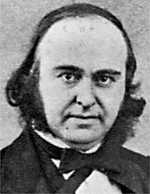June 28: Paul Broca (1824)
Paul Broca (1824)
It was on this date, June 28, 1824, that French anthropologist Paul Broca was born Pierre Paul Broca in Sainte-Foy-la-Grande, Bordeaux, France. He loved school and earned degrees in literature, mathematics and physics. He entered medical school in Paris at age 17 and graduated at 20. Broca’s chief contribution to brain anatomy, based on observations of patients with brain damage who were unable to talk, was the discovery of the location in the brain of the speech center, which has become known as Broca’s area.*
Because he was sympathetic to Darwin’s theory of natural selection—saying, “I would rather be a transformed ape than a degenerate son of Adam”**—Broca was accused by the Catholic Church of being a rebellious person, a materialist, and a corrupter of youth. Among other achievements, Broca founded the Anthropological Society of Paris in 1859. There was much church and state resistance to his founding of a Society for the study of the human species, and the Prefect of Police promised that Broca would be held responsible for anything said in meetings that may be “against society, religion, or the government.” A police spy was assigned to monitor the proceedings. (Broca, so the story goes, refused to excuse the policeman when he tried to take a break during one meeting, insisting that he stay and earn what he was paid for!)
Broca has been described as a Christian, but he must have practiced it lightly, because he founded a society for free-thinkers in 1848 and the Roman Catholic Church hounded him throughout his life. Indeed, Broca had little patience for superstition, saying, “Greedy for explanations, and rather than being satisfied with ignorance, the human mind treats itself to words devoid of meaning, like those American savages who in time of famine swallow clay to silence their empty stomachs.” After 1870, when the Third Republic had put the Church in its place, Broca was made a member of the Académie française. Six months before his death, he was elected Senator for life in honor of his achievements: indeed, his discovery of Broca’s area revolutionized scientific understanding of speech production, language processing and comprehension, and what effects damage to this area may cause. Paul Broca died at age 56, on 8 July 1880, victim of a brain hemorrhage. His name is one of the 72 names inscribed on the Eiffel Tower.
* Later research indicated that speech is too complicated a mechanism to be confined to one specific area of the brain.
** Carl Sagan, Broca's Brain, 1979. Sagan was quoting from 'Discussion sur la Machoire Humaine de la Naulette (Belgique)', Bulletin de la Societé d'Anthropologie de Paris, 2nd Series, I (1866), p595. Trans. Erik Trinkaus and Pat Shipman, The Neanderthals: Changing the Image of Mankind (1993), pp103-104. The full quote reads: “As for me ... I would much rather be a perfected ape than a degraded Adam. Yes, if it is shown to me that my humble ancestors were quadrupedal animals, arboreal herbivores, brothers or cousins of those who were also the ancestors of monkeys and apes, far from blushing in shame for my species because of its genealogy and parentage, I will be proud of all that evolution has accomplished, of the continuous improvement which takes us up to the highest order, of the successive triumphs that have made us superior to all of the other species ... the splendid work of progress. … I will conclude in saying: the fixity of species is almost impossible, it contradicts the mode of succession and of the distribution of species in the sequence of extant and extinct creatures. It is therefore extremely likely that species are variable and are subject to evolution. But the causes, the mechanisms of this evolution are still unknown.”
Originally published June 2003 by Ronald Bruce Meyer.


